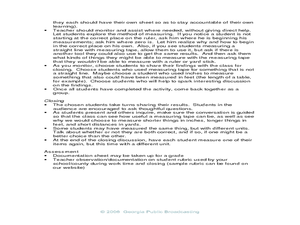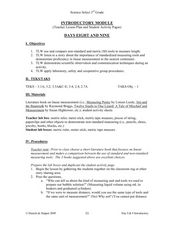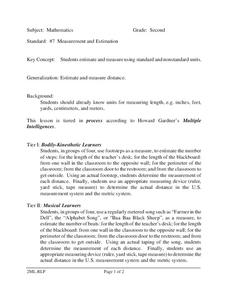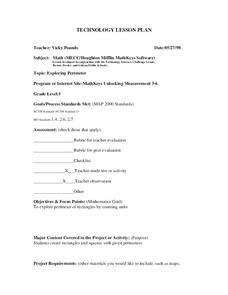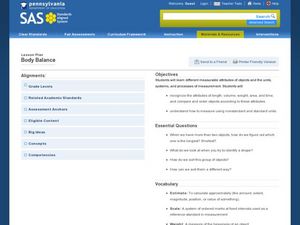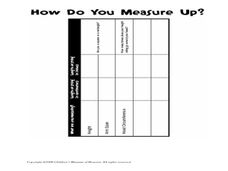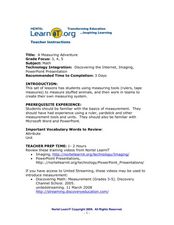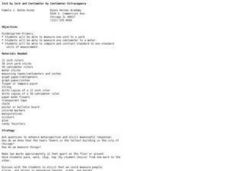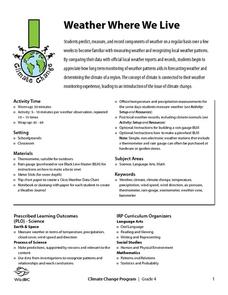Curated OER
Standard Units of Measure
Learners explore linear measurement. They choose appropriate measuring tools, measure three classroom items, and record their results. A class discussion ensues in which everyone decides the best way to present their data.
Curated OER
Introductory Module
Third graders examine the non-standard method of measurement and compare it to the metric system of measurement. In this introductory module lesson, 3rd graders discover the scientific observation. Students also develop communication...
Curated OER
Measurement and Estimation
Second graders explore estimation and measurement. In this estimation and measurement lesson, 2nd graders use footsteps to measure distances around the classroom. Students sing songs to measure the number of beats from one area to the...
Curated OER
Math-Measurement
First graders examine measurement. In this measurement lesson, 1st graders practice using nonstandard units to help in measuring objects. Students listen to How Big is a Foot and complete an activity using unifix cubes to measure line...
Curated OER
Is That Measurement Stuff For Real, Life?
Fifth and sixth graders engage in a series of activities which show them the importance of using different types of measurement strategies. One of the primary goals of the activity is to show learners that measurement is helpful in many...
Curated OER
Measuring Up with Apples
Second graders estimate and measure various classroom objects using an apple as their tool for measuring, and record their measurement results on a data worksheet.
Curated OER
Measuring Pattern Block Angles
Sixth graders identify various angles by using pattern blocks. In this measurement lesson, 6th graders find out how many degrees are in each of the different angles of the various pattern blocks.
Curated OER
Exploring Perimeter
Students explore perimeter. In this geometry and measurement lesson plan, students create squares and rectangles using given perimeters. Students construct four sided shapes with given perimeters using the computer program "Math Keys:...
Curated OER
Body Balance
Examine measurable characteristics of objects to build an understanding of the different ways you can discuss an object's size when comparing it to other objects. After whole group instruction, the class compares and organizes several...
Curated OER
How Do You Measure Up?
Students measure their body. In this measurement instructional activity, students use a string to measure their height and the circumference of their head. They record this information on the worksheet provided and answer questions as a...
Curated OER
Learning to Measure with Ladybug
Students practice measuring items with non standard units. In this units lesson plan, students measure shapes, lengths, and classroom objects.
Curated OER
Bearly There
First graders read "How Long Is A Foot?" together and use paper clips, teddy bears, crayons and other non-standard units to measure items. They compare the items measured and order them from longest to shortest.
Curated OER
Pancakes, Pancakes (Elementary, Science)
Read Pancakes for Breakfast by Tomi De Paola then participate in different activities which practice skills such as English language development, using non-standard measurement, fine motor skills, dramatic play, and using our five senses.
Curated OER
Estimation Challenge
Students calculate the length of the classroom using non-standard units of measurement and estimation. Using a cracker box, they discuss measuring various objects in the room as a class, and independently estimate and measure the length...
Curated OER
A Mass of Pennies
Learners estimate and determine the number of cents (pennies) that are needed to equal the mass of a variety of common objects. They develop a process for measuring and explore concepts related to units of measurement.
Curated OER
A Measuring Adventure
Students practice measuring items. In this measurement lesson, students read the book Measuring Penny and create their own system of measurement. Students measure various items in the classroom, using their creative measurement system.
Cornell University
Non-Newtonian Fluids—How Slow Can You Go?
Children enjoy playing with silly putty, but it provides more than just fun. Young scientists make their own silly putty using different recipes. After a bit of fun, they test and graph the viscosity of each.
Curated OER
Inch by Inch and Centimeter by Centimeter Extravaganza
Students use both standard and metric measurement. They compare and contrast standard to non-standard units of measurement.
Curated OER
Look at Those Leaves!
Students observe leaves. In this math and science cross-curriculum leaf instructional activity, students take a nature walk and collect leaves. Attributes are assigned and leaves are sorted in various ways. Students use non-standard or...
Curated OER
Foot Book Lesson Plan
Students measure items using non-standard units of measure. In this measurement lesson, students listen to Dr. Seuss', The Foot Book, before using oak tag feet to measure items. They use a large foot and a smaller one to measure...
Curated OER
How Many Fingers?
In this math worksheet, young scholars use non-standard measurement to measure 5 classroom items and record the data. Students use their fingers and then ask a classmate to do the same. Young scholars compare the data and answer 2...
Wild BC
Weather Where We Live
Over a span of two weeks or more, mini meteorologists record weather-related measurements. What makes this particular resource different from others covering similar activities are the thorough details for the teacher and printables for...
Curated OER
Length and Volume Exploration
Young scholars explore how to measure length and volume. They compare and order objects according to their measurable attributes and measure items using non-standard units. Students put 4 pencils in order from shortest to longest after...
Curated OER
Whatcha Gunna Do When the Hulkster's Measuring Too??
Young scholars measure using tools they have made. In this algebra lesson, students measure the height and distance using non-traditional measuring methods. They apply their findings to algebra and trigonometry properties of measurements.
